Frost was one of the most popular Michigan bands of the late 1960’s. Led by guitarist, singer, and songwriter extraordinaire, Dick Wagner, the group seemed poised to achieve national recognition with a collection of songs that were both heavy and tuneful. But they were saddled with a record company that undercut the band’s recordings with inadequate distribution and a lack of promotion that, as a result, severely hampered the Frost’s attempts to break big outside of Michigan. 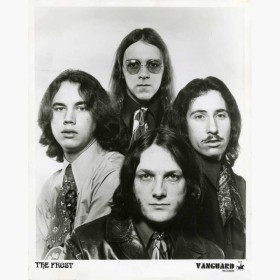 Frost (clockwise from top) Gordy Garris, Donny Hartman, Dick Wagner, Bobby Rigg
Frost (clockwise from top) Gordy Garris, Donny Hartman, Dick Wagner, Bobby Rigg
Dick Wagner was born in Oelwein, Iowa, in 1942. After his family moved to Michigan, Dick grew up in the musical hotbed of Southeastern Michigan. Like many teens in the 50’s, he was turned on by the new sound of Rock and Roll. His love of Chuck Berry, Little Richard, Elvis Presley, Jerry Lee Lewis, and other early greats inspired him to pick up the guitar.
Completely self-taught, Wagner first played guitar in a Waterford, Michigan, band called The Invictas. The band achieved local success, and they were considered good enough to back Jerry Lee Lewis at a roller rink in Ortonville and Roy Orbison at the Devil's Lake Pavilion near Adrian, Michigan, in 1960.
Wagner next joined a popular Detroit-area club band called The Eldorados as their lead guitarist. The band had a sax player as well as a keyboardist named Warren Keith; and they played early Motown, Rock and Roll, and Blues covers. At one of the band's gigs, Mitch Ryder (then known as Billy Lee) was the guest vocalist. Wagner played with the group until they broke up in 1964. 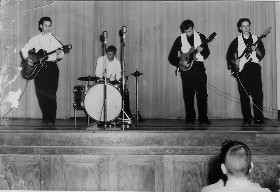 Dick Wagner (right) with The Invictas
Dick Wagner (right) with The Invictas
1964 would turn out to be a pivotal year for Dick Wagner. First, he left the Eldorados and moved to Saginaw, Michigan. There, he joined forces with Warren Keith, drummer Pete Woodman and bassist Lanny Roenicke in a band called the Playboys. Covering the hits of the day, the Playboys quickly became Saginaw’s hottest band with their regular gigs at a popular club on the Saginaw River called the Village Pump.
Secondly, Wagner first heard The Beatles early in 1964 on his car radio in Saginaw. The Playboys quickly learned the Beatles’ singles and album cuts and incorporated them into their sets. Next, inspired by the songwriting of John Lennon and Paul McCartney, Dick started to write some original material. His first effort was called “Lonely & Crying Over You”. According to a 2003 interview in Review Magazine, Del Shannon’s manager expressed interest in his song, and invited Wagner to New York City for a Shannon recording session. Unfortunately, Dick’s song was not released, but it did give him the impetus to continue to write for the band.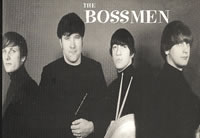 (L to R) Dick Wagner, Warren Keith, Pete Woodman, Lanny Roenicke
(L to R) Dick Wagner, Warren Keith, Pete Woodman, Lanny Roenicke
After changing the band name to The Bossmen, the group recorded and distributed their first single, “Take A Look (My Friend)” on their own record label. The catchy Beatles-inspired song was played regularly on Saginaw-area stations like WSAM and WKNX, and became a local hit.
As a result of their recording and appearances on the emerging teen club circuit, the Bossmen began to rapidly develop a fan base around the state. Dick did most of the songwriting for the Bossmen, and he produced a batch of popular radio-friendly singles including, “Here’s Congratulations”, “Help Me Baby”, “Bad Girl” “Wait And See”, and “On The Road” during the next three years on a variety of self-owned labels including Soft, Dicto and M & L. 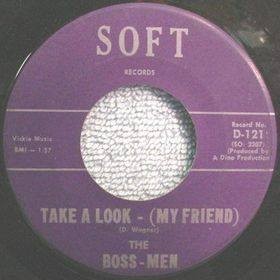
Wagner pioneered do-it-yourself techniques in other areas as well. He commonly booked the Bossmen in local Armory Halls around the state, renting the halls for an evening and then charging admission at the door. The Bossmen also became adept at promoting themselves at local radio stations by doing on-air interviews and participating in skits with the local deejays, especially Bob Dyer and Dick Fabian at WKNX radio in Saginaw, Michigan.
In the late summer of 1966, the Bossmen became a quintet with the addition of Mark Farner. Farner, who had recently left Terry Knight & The Pack, played rhythm guitar and sang backing vocals on the biggest Bossmen single, “Baby Boy”. Farner also developed his guitar-playing skills and songwriting talents in his brief stint under Wagner’s wing. Mark wrote and performed his first song, “Heartbreaker”, while in the Bossmen, and he learned some lead guitar techniques from Dick Wagner that he put to good use when he returned to the Pack in 1967, and later with Grand Funk Railroad.
According to Wagner in the Review Magazine interview, the Bossmen broke up over a scandal involving drummer Pete Woodman being busted for smoking marijuana. At the time it seemed like a big deal, and the band got a lot of negative publicity that resulted in Wagner dismissing the popular drummer from the band. Things fell apart quickly after that, and Wagner looked to form a new group by joining forces with a band hailing from Alpena, Michigan, called Bobby Rigg & The Chevelles.
The band, now comprised of Wagner, drummer Rigg, bassist Jack Smolinski, and guitarist Donny Hartman, was billed as the New Bossmen at an April 15, 1967, gig at Bay City’s Band Canyon. They also performed as Dick Wagner & The Bossmen and then as Dick Wagner & The Frosts at venues throughout Michigan. This rendition of the band recorded a pair of terrific singles on the Date label in 1967, “Rainy Day” and “Sunshine”. Both were good indications as to what was to come as the band evolved into the Frost.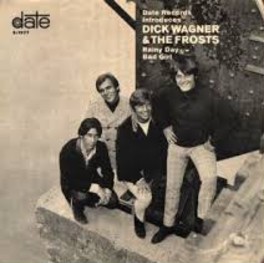 "Rainy Day" 45
"Rainy Day" 45
Dick Wagner also became involved with a number of Michigan bands at this time in the dual roles of both songwriter and producer. Wagner served as both for Saginaw’s Bells Of Rhymny on the single “She’ll Be Back/Wicked Old Witch” released on Wagner’s Dicto label in 1965. After the group had changed its name to the Cherry Slush, Wagner provided the band with its only nationally charting single when “I Cannot Stop You” reached # 119 on Billboard’s Bubbling Under The Hot 100 in 1968.
He also wrote and produced singles for two more Saginaw bands, Elation Fields and The Paupers. In addition, Wagner wrote and produced “Anytime You Want Some Lovin’/Easy Way Out”, the 2nd single by Grand Ledge’s Tonto & The Renegades. A certified Rock and Roll workaholic, Dick further managed to find the time to write “I’ve Got News For You” and “Wide Trackin’” for Mark Farner’s band, the Fabulous Pack. Several of these songs had originally been recorded by the Bossmen on Hugh “Jeep” Holland’s A-Square label out of Ann Arbor but were not released.
After failing an audition as guitarist for Blood, Sweat, And Tears in 1968, Wagner refocused on the Frost. He replaced Smolinski on bass with Gordy Garris, who had been playing in a Lansing-area band called the Beaux Jens, and the band began writing new songs.
The first big splash for the Frost in the Detroit area came at an outdoor concert in front of a crowd of over 10,000 at the Meadowbrook Theatre. The concert also featured the MC5 and the Stooges but the Frost stole the show with their combination of heavy guitars, melodic songs, and great vocals. 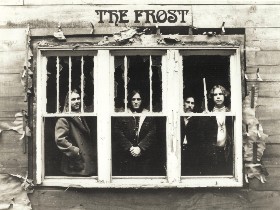 (L to R) Garris, Wagner, Hartman, Rigg
(L to R) Garris, Wagner, Hartman, Rigg
The Frost quickly became the talk of the Motor City and became regular performers at Detroit’s most prestigious rock venues, the Grande Ballroom and the Eastown Theater.
In the late 60’s, Michigan was a hotbed for Rock and Roll bands, and there were opportunities for the best of these groups to be signed by major recording companies. The Frost was being pursued by both Clive Davis of Columbia Records and Sam Charters at Vanguard Records. According to Wagner, Charters paid a great deal of attention to the Frost, flying in each week and wining and dining the group. Although Vanguard was mainly a Folk label, they spent the most time and effort in wooing the band, and Charters signed the Frost to his label in 1969.
The Frost went immediately into the studio and recorded the original songs they had been playing live for the last year. The resulting album was called “Frost Music” and it quickly became the # 1 LP in Michigan, selling over 50,000 units in a matter of months. Although it suffered from Sam Charters’ thin production, “Frost Music” was chock full of great guitar-driven songs and was listed among the Top 3 LPs for five consecutive weeks on Detroit’s powerful AM station WKNR. The album’s centerpiece, a combination of “Take My Hand/Mystery Man”, was a staple on Detroit’s FM stations for months.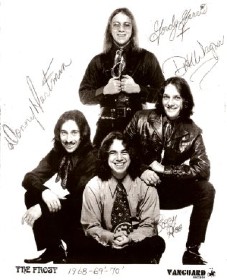
The band was at the peak of its popularity in Michigan during 1969, and Frost served as an opening act for many major artists playing in Detroit including Blind Faith, John Mayall, and Three Dog Night. Unfortunately, when they played outside of Michigan they found that they were getting virtually no promotion from Vanguard, and that the label was not doing a very good job of getting their album into record stores.
The realization that they had made a mistake in signing with Vanguard may have contributed to Frost’s rather schizophrenic 2nd album, “Rock and Roll Music”. Following in the footsteps of the MC5, whose “Kick Out The Jams” live album had reached # 30 on Billboard’s Pop Album Chart earlier in 1969, Frost also recorded a set at the Grande Ballroom for a live album.
The resulting LP, however, hedged its bet by combining some of the live performances with some new studio cuts. The result neither captured the excitement of a Frost concert, nor did it showcase the high quality Frost songs that were the strength of their first album as well as their live show. The great title cut, “Rock And Roll Music”, did become the Frost’s only Billboard charting single, however, peaking at # 105 in December of 1969. In recent years, Vanguard has released the entire original Grande Ballroom set on a CD with the misleading title of “The Best Of The Frost”.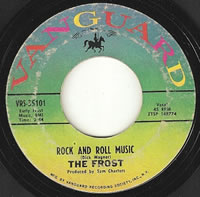
By the start of the new decade, some of the best Detroit-area bands including the MC5, the Rationals, SRC, and the Amboy Dukes had failed to live up to their promise as recording acts. Somewhat surprisingly, the Michigan bands that made it biggest in 1970’s were a pair of latecomers to the scene, Grand Funk Railroad and Alice Cooper.
Frost’s final and, in Dick Wagner’s opinion, best album, “Through The Eyes Of Love”, was released in 1970. The album contained seven great songs including two, Wagner’s “Black As Night” and Donny Hartman’s “Fifteen Hundred Miles (Through The Eye Of A Beatle)”, that had been originally recorded at the Grande Ballroom but left off of “Rock and Roll Music”. Despite the overall quality of “Through The Eyes Of Love”, the Frost again fell victim to Vanguard’s lack of support and the album sold poorly.
Wagner related in an interview in 2003 that when the Frost went out to San Francisco to open for B.B. King at the Fillmore West in support of their new album, the crowds loved them but everywhere they went their records were nowhere to be found. Vanguard had sent no representatives to support them, so without vital label promotion no one in the cities they were playing in knew anything about the Frost. Band members felt that their record label had let them down and that they were basically on their own. This in turn resulted in resentment and a loss of group morale.
Management also contributed to the problem. After they had arrived to play the Fillmore West gig, they found they had been bumped from the bill because their manager, Bob Hankins, had failed to sign a contract with Bill Graham. Wagner begged Graham to let The Frost perform at the show; but the humbling experience was a far cry from the band's exalted status at the Grande Ballroom and many other venues in the Midwest. .jpg)
In the summer of 1970, The Frost played before the biggest audience in the band's existence at the Goose Lake Festival, near Jackson, Michigan. The Frost performed in the 5:00 P.M. slot on Friday afternoon in front of a crowd of over 200,000 rock and roll fans; and Dick Wagner calls the event one of his most treasured memories of all the live performances in his career. It was also the first time he heard his future band mate Steve Hunter play guitar. Hunter was the lead guitarist in Detroit with Mitch Ryder and playing Goose Lake on the same day.
According to Wagner, the end of the Frost came when drummer Bobby Riggs became upset that the band wasn’t getting the adulation on the road that it routinely received in Michigan. At the start of a tour of Canada, Riggs decided he no longer wanted to continue, and he left the rest of the group in Toronto and flew home. Wagner had to cancel the remaining shows, and that signaled the demise of the original Frost. Hartman and Riggs later tried to rekindle the Frost in 1971 and 1972 with new bassist Rick Bozzo and keyboardist Robin Robbins, but without Wagner and Garris, the band was only a pale shadow of its former self.
After the Frost break-up, Dick Wagner traveled to New York where his new manager pitched him the idea of joining a band he was putting together called Ursa Major. Originally, Billy Joel was to be the keyboardist in the trio. Joel at that time, however, was undergoing some severe emotional problems due to marital strife and had to drop out of the project. Wagner recruited bassist and keyboardist Greg Arama from Michigan’s Amboy Dukes to fill the void. Dick Wagner then took over leadership in the band and wrote all seven songs for the band’s self-titled debut album, “Ursa Major”, produced by Bob Ezrin.
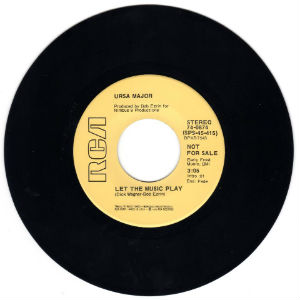 Although the album received positive reviews and Ursa Major toured as an opening act for both Alice Cooper and Beck, Bogart & Appice, the album didn’t sell and the band dissolved. Wagner was then called by producer Bob Ezrin to play guitar on some Alice Cooper sessions. Dick played uncredited on the “School’s Out”, “Billion Dollar Babies” and “Muscle Of Love” albums and established a close friendship with Alice.
Although the album received positive reviews and Ursa Major toured as an opening act for both Alice Cooper and Beck, Bogart & Appice, the album didn’t sell and the band dissolved. Wagner was then called by producer Bob Ezrin to play guitar on some Alice Cooper sessions. Dick played uncredited on the “School’s Out”, “Billion Dollar Babies” and “Muscle Of Love” albums and established a close friendship with Alice.
The connection with producer Ezrin led to Wagner’s next gig, playing guitar on Lou Reed’s “Berlin” album. Dick and fellow Michigander Steve Hunter, who also played on “Berlin”, then joined Reed’s touring band. This resulted in 1974’s highly acclaimed “Rock ‘N’ Roll Animal” live album on which the twin guitars of Wagner and Hunter overshadowed Lou Reed’s performance.
After the break-up of the original Alice Cooper band, Cooper decided to go solo and Wagner was brought in to help Alice write a ‘concept’ album. The two went to Nassau in the Bahamas and eventually came up with ideas and songs for the “Welcome To My Nightmare” album. Wagner and Cooper settled into a songwriting partnership in which Dick would compose the music and Alice would come up with the lyrics. The album’s big hit single was a ballad called “Only Women Bleed”. Cooper changed the words to a song Dick had written back in 1968 called “I’m Moving On”. Released as “Only Women”, the single was a huge hit and it helped propel the ‘Welcome To My Nightmare Tour’ into one of the biggest and most successful rock productions of the 1970’s. The tour’s elaborate stage show, which featured both Dick Wagner and Steve Hunter on guitars, set the standard for Rock and Roll theatrics. 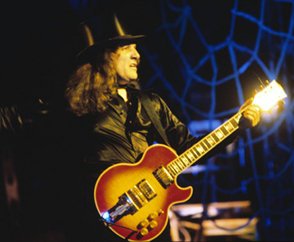 Wagner on Welcome To My Nightmare tour
Wagner on Welcome To My Nightmare tour
The songwriting partnership between Cooper and Wagner flourished for the next few albums before Alice’s alcoholism got the best of him. The pair collaborated on three more hit big singles in the late 70’s, “I Never Cry”, “You And Me”, and “How You Gonna See Me Now”, before Cooper was institutionalized for his drinking problems.
Since that time, Dick has done some solo projects, wrote hit material for Air Supply, worked off and on with Alice Cooper, and joined John Bradshaw in the Remember The Child project. He returned to Saginaw in the 1990’s and opened his own recording studio. While in Saginaw, Wagner performed his Remember The Child music with John Bradhaw, the Saginaw Bay Symphony Orchestra, and a gospel choir during a memorable outdoor concert on the campus of Saginaw Valley State University.
Donny Hartman lives in Northern Michigan and performs and records with the Donny Hartman Band. Bobby Rigg has played with Wagner and Hartman in several Frost reunions, and he recorded the CD single, “This Band Can Rock And Roll Forever/In The Middle Of The Night” with them in 1999 as part of the Frost 30th Anniversary Tour. After the Frost, Gordy Garris played in Whipeye and then in the Gordy Garris Band. He continues to be involved in music as a songwriter, but he has not participated in the Frost reunions.
In 2005, Dick Wagner closed his Saginaw recording st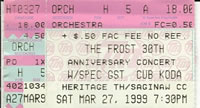 udio and moved permanently to Phoenix, Arizona. In 2007, he suffered a major heart attack. Happily, Dick made a remarkable recovery, began playing guitar again, and started producing a new artist called Wensday for his independent label Desert Dreams Records. Wagner also started working with his old guitar partner Steve Hunter, and there was the possibility that Dick and Alice Cooper would write together again in the near future.
udio and moved permanently to Phoenix, Arizona. In 2007, he suffered a major heart attack. Happily, Dick made a remarkable recovery, began playing guitar again, and started producing a new artist called Wensday for his independent label Desert Dreams Records. Wagner also started working with his old guitar partner Steve Hunter, and there was the possibility that Dick and Alice Cooper would write together again in the near future.
Frost was voted into Michigan Rock and Roll Legends Hall of Fame in 2008. Two of Wagner's compositions with the Frost have been voted Legendary Michigan Songs : "Mystery Man" in 2010 and "Rock and Roll Music" in 2012.
Dick Wagner made a triumphant return to performing live in the fall of 2011 after a nearly five-year battle with serious health issues. Wagner and his band played a memorable two-night stand at White's Bar in Saginaw in front of friends and fans, many of who went back to his days in the Bossmen.
In January of 2012, Not Only Women Bleed, Dick Wagner's revealing book about his rock and roll career, went on sale as an eBook on Amazon.com. In June of 2012, four of Wagner's compositions were voted Legendary Michigan Songs: "Rock And Roll Music" by The Frost, "Anytime You Want Some Lovin'" and "The Easy Way Out" by Tonto & The Renegades, and "I Cannot Stop You" by the Cherry Slush.
Sadly, Dick Wagner passed away on July 30, 2014, in Scottsdale, Arizona. Wagner succumbed to respiratory failure after two weeks in intensive care following a cardiac procedure.
In February 2021, former Frost bassist Gordy Garris passed away in Michigan after suffering a massive stroke and susequent cardiac difficulties.
Dr. J. Recommends:
“Frost Music”. Despite the rather poor production, this is a great collection of guitar-driven rock and roll songs that established Frost as one of Michigan’s premier bands.
“Through The Eyes Of Love”. Frost’s third and final album should have been a major hit. This is Dick Wagner’s favorite Frost album.
“The Complete Bossmen: The Singles ’64 – ‘67”. Wagner produced and recorded this great collection of songs with the Bossmen. It also includes the early Frost singles “Rainy Day” and “Sunshine” that are unavailable on the Vanguard albums.
On The Bookshelf: Not Only Women Bleed: Vignettes from the Heart of a Rock Musician by Dick Wagner. 2012 Desert Dreams Productions, LLC
This is a great rock and roll book! Dick Wagner is very candid in recounting the ups and downs of his long and colorful career as one of rock and roll’s great guitarists and songwriters. His memoir is broken into 192 short stories or vignettes that are mostly chronological and completely entertaining. Wagner's book was the main source used in the writing of both the Frost and the Dick Wagner MRRL biographies.

